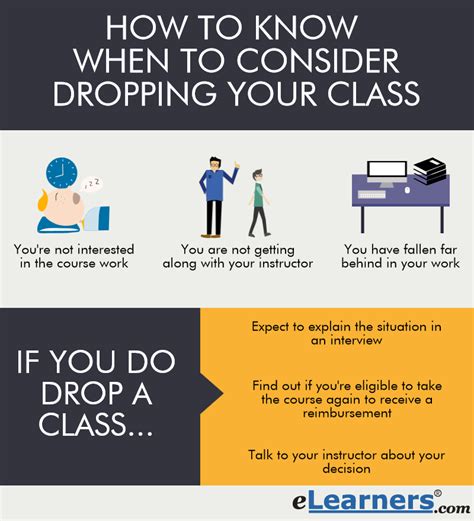It’s a common question with a complex answer. Dropping a class can have various consequences, both positive and negative. The impact will depend on several factors, including your academic standing, financial situation, and future plans.

Academic Consequences
GPA and Transcript
Dropping a class will negatively impact your GPA, as it will count as a “W” (withdrawal) on your transcript. This can be especially damaging if you’re already struggling academically or if you’re close to graduating.
Course Completion Requirements
Dropping a class may affect your ability to fulfill course completion requirements for your major or degree program. You may need to take an additional course or delay graduation to catch up.
Financial Consequences
Tuition and Fees
If you drop a class before the add/drop deadline, you may not have to pay tuition or fees for that course. However, if you drop a class after the deadline, you will likely be responsible for the full cost of the course, even if you don’t attend any classes.
Financial Aid
Dropping a class may affect your eligibility for financial aid. If you receive federal student loans or grants, you must maintain a certain GPA and enrollment status. Dropping a class could jeopardize your financial aid eligibility.
Career and Future Plans
Career Goals
Dropping a class may affect your career goals if it’s a required course for your major or intended profession. You may need to take an additional course or delay graduation to fulfill the requirement.
Graduate School
If you plan on attending graduate school, dropping a class may affect your application. Graduate schools often look at your GPA and transcript when making admissions decisions.
Personal Consequences
Stress and Anxiety
Dropping a class can be stressful and anxiety-inducing. You may worry about falling behind in your studies, affecting your GPA, or jeopardizing your future plans.
Self-Esteem
Dropping a class can damage your self-esteem. You may feel like a failure or like you’re not capable of handling the workload.
Tips and Tricks
Consider Your Options
Before dropping a class, carefully consider all of your options. Talk to your professor, advisor, or other trusted sources to get advice and guidance.
Plan Ahead
If you’re struggling in a class, don’t wait until the last minute to drop it. Plan ahead and talk to your professor about your concerns. They may be able to offer support or resources to help you succeed.
Check the Deadline
Make sure you understand the add/drop deadline for your school. Dropping a class after the deadline will likely result in financial penalties.
Communicate With Your Instructor
Always inform your instructor if you plan to drop their class. This is a professional courtesy and will help avoid any misunderstandings or conflicts.
FAQs
Can I drop a course without penalty?
Yes, if you drop a course before the add/drop deadline set by your school.
What if I drop a course after the deadline?
You are likely to be financially responsible for the full cost of the course. Your GPA will also be negatively impacted.
Will dropping a course affect my financial aid?
Yes, dropping a course may affect your eligibility for financial aid if you receive federal student loans or grants.
How can I avoid dropping a course?
Seek support from your instructor, advisor, or other resources if you are struggling in a class. Plan ahead and be proactive to address any potential issues.
